SKorea fosters startups as it seeks economic shift
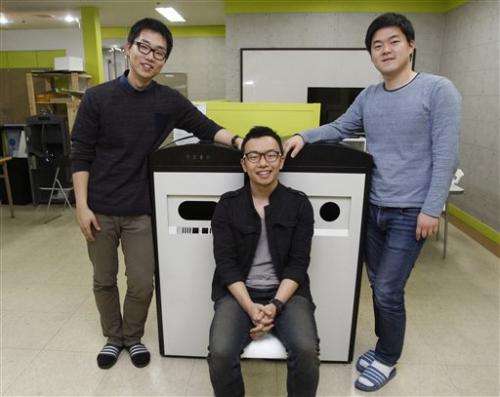
Kwon Sunbeom's future was mapped out. Talented in math and science, he attended a specialized high school and majored in electronic engineering at a prestigious university. Lifetime employment at one of South Korea's towering conglomerates beckoned.
Instead, while his peers were seeking jobs at Samsung and LG, he scaled back his studies and started a company with friends. Together they invented a garbage bin that compresses rubbish using solar power and wirelessly communicates to be collected when full.
Using 50 million won ($44,000) of their own money and channeling the business in a garage spirit that made Silicon Valley famous, they lived for a month in a shabby factory without air conditioning, subsisting on instant noodles, to make their first prototype. So far they have sold 31 of their "Smart Bins" to universities in Seoul and another 12 to Saudi Arabia and the United Arab Emirates.
"I saw a garbage bin overflowing with trash in the street one day and thought someone should press them down," said Kwon. "Because there was no one, I thought it should be done by a machine. And because it was located outside, I thought it can use the solar energy as a power source."
Kwon, 25, is the kind of risk taker South Korea's government says it wants to cultivate as it reckons with diminishing returns from years of reliance on state-favored companies known more for their massive scale and aggressive competitive instincts than bold thinking and creativity.
The chaebol, as the conglomerates are known, helped transform South Korea into a wealthy industrialized powerhouse but are increasingly criticized as part of a fraying economic setup based on copycatting innovations from abroad. South Korea is also casting a nervous eye at up-and-coming Chinese companies such as Lenovo and ZTE that aspire to beat South Korean companies at their own game.
Since taking office in February, President Park Geun-hye has held up Steve Jobs and Bill Gates as examples of the talent that South Korea needs to foster.
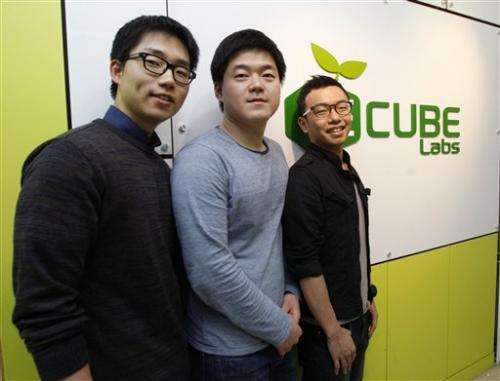
Among the policies aimed at nurturing a "creative economy," South Korea is pouring more than 3 trillion won ($2.7 billion) into funding startups, establishing a third stock market to help new ventures raise money, and changing laws to lower hurdles for crowd-funding. To increase the chances of a financial payoff for entrepreneurs, it plans to give tax breaks and other incentives to big companies that invest in startups.
"We feel the limits of the economic strategy that led our economy in the past," said Choi Soon Hong, Park's adviser on future strategies, at a briefing earlier this month. "From the past growth model based on imitation and catching up, we have to change the growth model based on creativity and leading."
The lofty aspirations are set against cultural values that inhibit risk taking: an emphasis on respecting seniority and hierarchy, long working hours meant to demonstrate loyalty to company and intense pressure for the young to succeed at school and college.
"Honestly, school is absolutely not helpful," said Kwon, who while running Ecube Labs is paying full tuition and doing the minimum course work required to graduate. "If it were like the U.S., I would have dropped out. But in South Korea people still ask which school I went to."
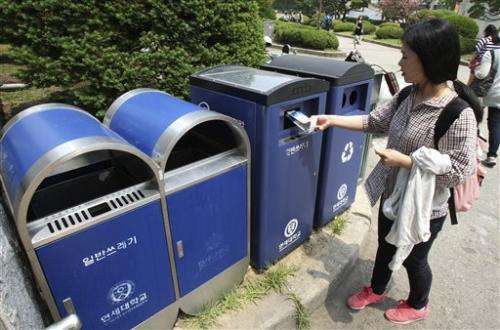
"Sometimes I feel like I'm in a dilemma. When I'm in school, I think about work."
Still, there is no shortage of belief in South Korea that it can bring about another transformation. After fighting in the 1950-53 Korean War ended in a truce, the South's economy was in ruins. Within a generation it was emerging as one of Asia's most dynamic nations.
Park, the current president who wants to inspire original thinking, is the daughter of dictator Park Chung-hee who championed rapid industrialization and the rigid, efficiency-at-any-cost culture of the conglomerates.
Added impetus for change has come from a U.S. court's stinging rebuke in 2011 of Samsung Electronics Co., the flagship of the Samsung empire, for infringing Apple Inc.'s intellectual property. Although a federal judge reduced the $1 billion fine that a California jury imposed on Samsung for copying Apple's iPhone and iPad, the verdict was a reminder for South Korea that the success of its biggest company was built on the innovations of others.
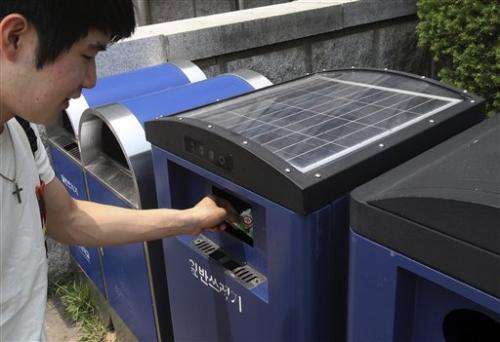
"Samsung is the world best in producing goods or services that others make at cheaper costs and differentiating them by adding new features," said Song Jaeyong, a professor at Seoul National University who has served as an external advisor for Samsung since 2004. "But it had not made what doesn't exist in the world, like Apple did."
"Samsung's culture is a culture of hierarchy, a culture that emphasizes efficiency, which was great for enhancing competitiveness in manufacturing," said Song. "But for creative innovation, it is important to have diversity, openness, flexibility, open communication and an attitude of learning from failures. Samsung's corporate culture lacks these qualities."
After the California verdict, Samsung began experimenting.
In December it began a project, dubbed Creative Labs, which seeking to emulate a startup ethos, allows some employees to take 6 months to a year off their regular work to collaborate on projects that no deadlines, profit targets or rigorous management rules.
Ki Yuhoon, a low-ranking engineer in Samsung's semiconductor division, can hardly believe she is now leading a team that includes a designer, a developer, and a marketer who are all older and more experienced.
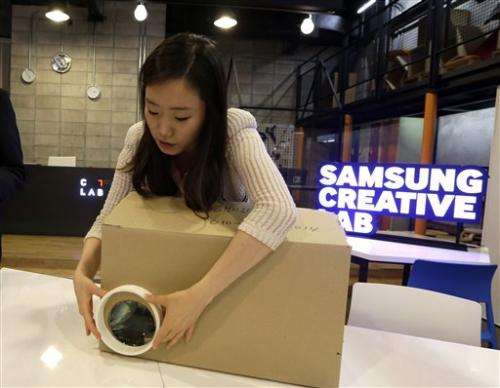
"Because I have a control over the entire project, I can try anything I want," said Ki, who has moved from a typically drab Samsung office to an open plan space in Seoul's ritzy Gangnam district that is decked out with bare concrete walls, high ceilings and colorful chairs and couches.
In her usual job, she could not see the outcomes of her work for customers, but this summer she is visiting the Congo to test a prototype movie projector made with used handset screens. The goal is to figure out how to make a portable movie projector using materials readily available in the country, she said.
But it is baby steps for Samsung and there's no suggestion of changing its overall culture.
Creative Labs "will stay outside the system," said spokesman Kim Deuggeun.
© 2013 The Associated Press. All rights reserved.



















